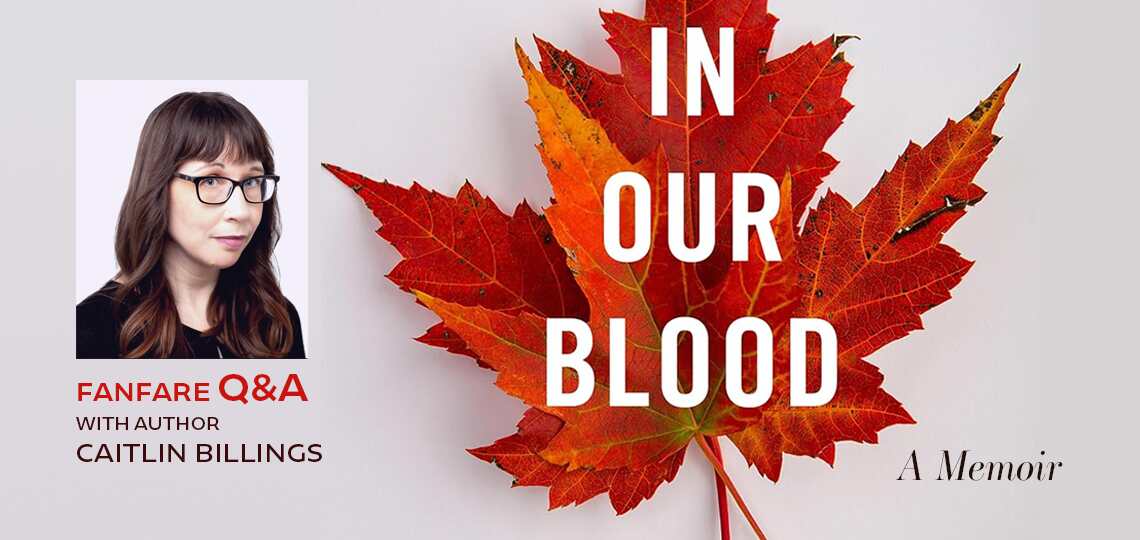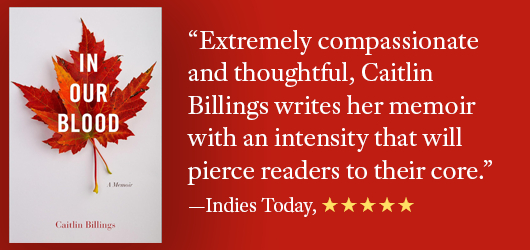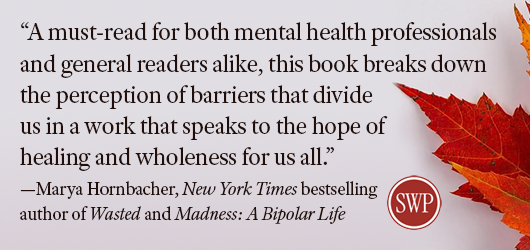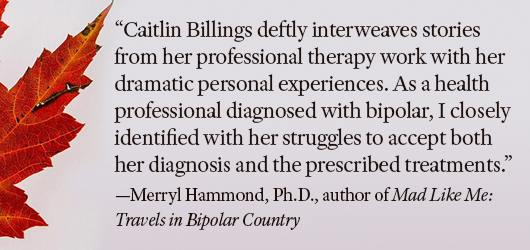The stories we inherit and how we heal: interview with Caitlin Billings, author of In Our Blood

Editor Danielle Ballantyne Interviews Caitlin Billings, Author of In Our Blood
Know thy enemy. You know the phrase from Sun Tzu’s Art of War and it is incisive advice for anyone facing crisis or adversity of any kind.
Today, we’re with Caitlin Billings, a professional therapist who struggled with mental health issues and consciously chose her social work career path to better understand her condition and provide support for others. Her memoir, In Our Blood, resonates with honesty and compassion. By sharing her journey through abandonment, trauma, eating disorders, self-injury, and the unrelenting challenges of mental illness, she creates not just a story, but a mirror for so many who are struggling in silence. Her willingness to lay bare her vulnerabilities, as both a therapist helping others and as a mother supporting her own child, makes this memoir both raw and deeply human.
Hoping to help share her story with others, we assigned Foreword’s Danielle Ballantyne to connect with Caitlin for the following conversation.
Your memoir opens by recounting your first admission to a psychiatric hospital—a powerful, intimate introduction to the narrative to come. Did you hesitate at all to reveal such personal aspects of your life? If so, what inspired you to push through the discomfort?
Opening the book with the rawness of my first hospitalization was, indeed, a risk. Over the ten years writing and constructing it, I struggled with including deeply intimate moments, especially those in which I was spiraling downward to what seemed like an irrevocably bad place. I even toyed with the idea of using a pen name so that clients who discovered my memoir wouldn’t be faced with uncomfortable feelings about their therapist and her stability.
That being said, one of the guiding reasons I wrote this book was so others wouldn’t feel so alone in their mental health struggles, especially those who encounter stigma. Even with my doubts and fears, my intuition told me that the “right” path was to put my name on my book. I was so tired of hiding, and I wanted to show others it was possible to have a full life without hiding as well.
Your training and career as a therapist is something of a double-edged sword throughout the memoir: it helps you better understand what is happening to yourself and your children but also, at times, seems to make you feel especially helpless at not being able to control those things. What would you say to others who are experiencing this tension between their professional and personal lives?
I think we spend so much time in fear of judgment and stigma, not realizing we are colluding with those judging and stigmatizing. One of the fundamental pieces of my own recovery was my therapist. I knew I could go to her with anything and she would support me to get the help I needed. Maybe I’m biased because I’m a therapist, but having a team of trusted friends, family, and professionals is vital. Seek people you can trust, learn as much as you can about what is happening to you, and remember, your employer comes after your health and wellness.
I would also remind others that just because we understand what is happening, it doesn’t mean we have control over it. The worst thing we can do is to shame ourselves for the out-of-control nature of mental illness, be it depression, anxiety, bipolar, or something else. Turning away from shame and toward balance has been incredibly impactful for me, but it took me many years to understand the power of that shift. And, balance still feels elusive at times, but I think I’ve finally worked through my internalized stigma and am much more forgiving of myself and my needs. It’s not shameful to need extra sleep, or the day off, or to let go of a contract that is just too much. Recently, I said goodbye to a wonderful part-time contracted position because I could feel the stress building beyond what I could handle. It was the first time I’d left a job without it ending in a hospitalization, and I feel immensely proud of that.
You also speak in your memoir on the stigma of mental illness and how it complicates people being willing to accept their need for and seek out professional intervention. People are worried that utilizing mental health resources may change how their friends, family, employer, etc., perceive and interact with them. What would you say to someone who is hesitating to take that step and get professional help?
If you suspect that there’s something wrong, or you feel like there’s something “off,” you deserve to feel the unconditional regard of a therapist who is trained to care for others and their psyches. If it’s a matter of stigma within your community, there are many therapists from many ethnicities, identities, and walks of life who will understand the trepidation and help to normalize it for you. If you’re a person who “this shouldn’t be happening to,” I promise that you will feel better reaching out than holding it all inside. The pressure just gets to be too much.
I think the therapy industry has really changed for the better. Therapists reveal their identities more, such as therapists with autism, ADHD, trans therapists, therapists of color, etc. It’s important to remember that therapists are people, too, and most of us went into the profession because of our own experiences with mental health. There are many types of therapy to choose from.
My recommendation would be to research therapists in your area or through your insurance carrier, review their websites, and look for a therapist who really speaks to you. During your first session, ask the therapist about themselves. Share with them you’re feeling influenced by stigma. Their reaction and responses will let you know if you’re in the right spot, or if you need to keep searching.
The memoir also includes your child’s transition from female to male and is very honest about your initial confusion and anxiety around that. What advice would you offer to parents starting that journey that you wish had been available to you? Are there any resources for parents that you would recommend?
First, I am very troubled by the political environment surrounding trans youth and adults. As a parent, I am terrified for my child (who is now an adult) and can’t imagine navigating the stress of a child coming out in this atmosphere, although there are many parents doing it and providing love, support, and care for their kids.
I wish someone had normalized my grief for me. I think part of the tension I felt had to do with my fear of being transphobic. I also wish my fear had been more legitimized, such as when Avery used a men’s public restroom for the first time and I hovered a few feet away, imagining all the potential catastrophic events he would be exposed to in that bathroom. It worked out, and we went on our way, but I can still remember exactly where I was in our local Target, surrounded by other shoppers and the smell of coffee in the air.
Bathroom politics aside, I would advise parents with a newly out trans child to allow themselves to feel whatever amount of pain and sadness is personal to them associated with such a change. Some parents celebrate the transition, but others struggle. For those who struggle, I would say that loving and allowing your child to express their gender identity is crucial, but it’s also crucial to find other parents who are in a similar place and can hold space for the tears, struggles, and sadness of the loss of your child’s gender assigned at birth.
There are parent support groups here in the Bay Area, and I would advise to check with your pediatrician or therapist to find some in your area. Some of the most healing conversations I have had have been with other parents.
The subject of transgender children has become an increasingly polarizing topic in recent years, bringing about hostile legislation and dangerous misinformation. What are just a few things that you wish you could make everyone understand about trans kids?
Trans kids are just like any other kids—quirky, funny, creative. Trans kids hold an extra understanding of the human experience and have felt the immense pain and hurt of being misunderstood, mis-gendered, and hated by people who are misinformed. Trans kids have a depth to them I imagine comes from the journey they have been on to understand themselves and the world around them. The trans kids I know have a deeply developed sense of empathy for others.
Lastly, are you working on anything else at the moment—book or otherwise—that you could tell us a little about?
I’m currently working on a new memoir about my experience as an exchange student in Mexico and the displacement I felt in both place and self. It’s about how I disappeared, and the journey of coming all the way back to where I started.
Danielle Ballantyne



